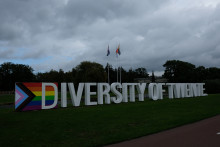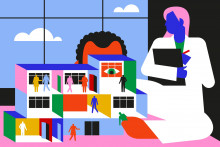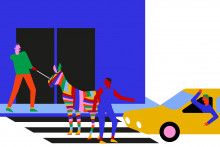What is the main focus of this plan?
‘Our main goal is to create a safe university where everyone feels welcome and can develop themselves to their full potential. Obviously, we are all diverse; everyone who studies or works here brings their own taste of diversity to the table. Now, we need to create more inclusion, meaning creating a safe community where people can fully be themselves, participate and perform at their best. Diversity is a fact, inclusion is an act.’
Is the UT not inclusive enough?
‘The UT has been evolving for sixty years. I think it’s good to acknowledge that we are constantly growing and that times are changing, so we can re-evaluate our position, change what doesn’t work and expand on what works. What’s important, is that we have a baseline to work from. Since I started last year, I have been asking students and staff where they believe we are now, based on a maturity model, with diversity and inclusion steps being ‘aware’, ‘compliant’, ‘strategic’, ‘integrated’ and ‘disruptive’.
What I hear mostly is that we’re somewhere between being compliant – D&I has to be done, so we do it, and strategic – D&I is important to our success. That’s definitely not a bad starting point, but we ideally want to be disruptive. We want to be a leading example for what best diversity and inclusion practices should look like at a university.’
'Ideally we want to have a first all-gender toilet by October'
So, in view of the growingly heated discussion about ‘woke’ culture, how ‘woke’ is this action plan?
‘While we want to be disruptive in the long-term, I would not call this a woke action plan. It’s not that we’re saying we should decolonise the curriculum all at once, change every toilet group on campus into all-gender ones, and only hire female staff, for example. I don’t think that’s the right way to go. Diversity and inclusion is a process – and a slow and steady one at that. We can take it step by step. Yes, ideally we want to have a first all-gender toilet by October, for instance. And if a teacher wants to decolonise their curriculum, we can provide tools to help them do so. But again, it is a communal cultural shift that also needs to come from within the university.’
Since this is an action plan, what concrete steps will be taken shortly?
‘This plan of action is a starting point for all of us. This needs to be a community wide effort. On my part I can initiate and strategize, but ultimately we will get absolutely nowhere if we don’t all internalize it and start actively treating others the way we want to be treated ourselves.
To get people going in the short-term, it’s all about creating awareness, support and a sense of urgency. And celebrating diversity by sharing stories and experiences. So we plan to have a strong D&I focus during the Kick-In and a UT-wide diversity & inclusion week this Autumn, in which we focus on a different aspect of diversity every day to cover the theme broadly. For example, we’re enthusiastically planning to have a drag race to celebrate LGBTQI+ diversity. We’re also in the process of writing a UT anti-discrimination statement and want to publicly sign the UN Declaration on Inclusive Education for students with a Disability.
In the middle-long term, we aim to bring together the plethora of activities regarding diversity and inclusion that the UT is involved in. I hope to position myself as someone who connects these initiatives. Meanwhile, we need to measure our progress. At the end of the day, inclusion is very much connected to a person’s wellbeing. So we aim to include more qualitative questions in our wellbeing surveys. Think of questions like: do you feel included? And: do you feel allowed to express yourself?’

Sterre Mkatini.
In the plan, you specifically choose equity over equality. Why?
‘Equality is trying to treat everybody the same, which is what we’ve been trying to do at the UT, but not everybody always benefits from the same support. Equity is making sure everyone gets the support they need. So, offering tools that you need specifically to take away obstacles that you might be facing so that you can fully flourish as a person.’
'For now, equity is something we can realistically strive for'
Won’t that approach lead to some form of imbalance and jealousy?
‘I don’t think so. It’s like eating a cake. For example, giving everyone the same portion of cake abides with the law of equality. Equity, however, is taking into consideration that some people might be diabetic or have allergies and therefore should not be given any cake to begin with. The ideal situation is not equality or equity, but justice. Meaning all possible obstacles have been removed for everyone to thrive. But for now, equity is something we can realistically strive for.’
Which groups need an equity boost?
‘Within the Shaping Expert Group Inclusion, we’ve identified several themes: Internationals, Disability, First Generation Students, Ethnicity, Race and Religion, Gender (Identity) and Sexual Orientation. But these are subject to expand, as we gain more voice and visibility for the work we are doing. Now it comes down to understanding what obstacles these groups are facing, so we can see how to start removing potential barriers. For example, the current parental leave policy doesn’t give much room for a single LGBTQI+ employee who wants to go into the process of adopting a child. That’s a barrier we can remove relatively easily, by re-evaluating this policy.’
'Let’s not be afraid to make mistakes as we move forward'
Moving forward, what do you expect from the UT community?
‘What I would love to see is that we understand the sense of urgency to work on diversity and inclusion. I want us to dare to ask each other tough questions, take part in – perhaps sometimes difficult – conversations about the issues we face, respect each other while doing so and hold each other accountable for our actions. Let’s not be afraid to make mistakes as we move forward, learn from them and implement those learnings. It’s a fun, exciting and maybe also scary process we’re immersing ourselves in. We need to work together to really embody the change we want to see.’







